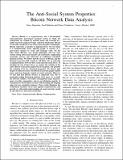The Anti-Social System Properties: Bitcoin Network Data Analysis
Author(s)
Alqassem, Israa; Rahwan, Iyad; Svetinovic, Davor
DownloadAccepted version (860.5Kb)
Terms of use
Metadata
Show full item recordAbstract
© 2018 IEEE. Bitcoin is a cryptocurrency and a decentralized semi-anonymous peer-to-peer payment system in which the transactions are verified by network nodes and recorded in a public massively replicated ledger called the blockchain. Bitcoin is currently considered as one of the most disruptive technologies. Bitcoin represents a paradox of opposing forces. On one hand, it is fundamentally social, allowing people to transact in a peer-to-peer manner to create and exchange value. On the other hand, Bitcoin's core design philosophy and user base contain strong anti-social elements and constraints, emphasizing anonymity, privacy, and subversion of traditional centralized financial systems. We believe that the success of Bitcoin, and the financial ecosystem built around it, will likely rely on achieving an optimal balance between these social and anti-social forces. To elucidate the role of these forces, we analyze the evolution of the entire Bitcoin transaction graph from its inception, and quantify the evolution of its key structural properties. We observe that despite its different nature, the Bitcoin transaction graph exhibits many universal dynamics typical of social networks. However, we also find that Bitcoin deviates in important ways due to anonymity-seeking behavioral patterns of its users. As a result, the network exhibits a two-orders-of-magnitude larger diameter, sparse tree-like communities, and an overwhelming majority of transitional or intermediate accounts with incoming and outgoing edges but zero cumulative balances. These results illuminate the evolutionary dynamics of the most popular cryptocurrency, and provide us with initial understanding of social networks rooted in and driven by anti-social constraints.
Date issued
2020Department
Massachusetts Institute of Technology. Media LaboratoryJournal
IEEE Transactions on Systems, Man, and Cybernetics: Systems
Publisher
Institute of Electrical and Electronics Engineers (IEEE)